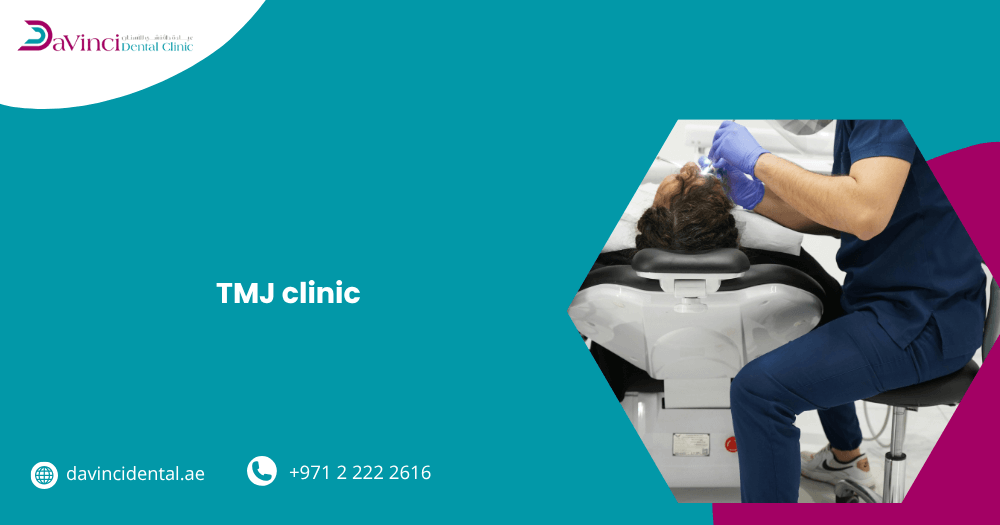Issues with your temporomandibular joint (TMJ), which is the hinge that connects your jawbone to your skull, can be the cause of your jaw pain, clicking sounds, or trouble eating.
Your everyday life can be impacted by the pain and tension this joint causes when it is strained or misaligned.
A Specialized TMJ clinic can help you with this issue by providing advanced treatments to restore the function, comfort, and balance of your jaw while diagnosing and treating problems such as temporomandibular disorders (TMD).
In this article, we’ll look at what TMJ and TMD are, their causes, various treatment methods, and how to choose the best TMJ clinic in Abu Dhabi for long-term relief.
Table of Contents
What is TMJ?
The joint that joins your lower jaw to your skull is called the temporomandibular joint, or TMJ for short. It enables you to move your jaw side to side, up, and down. Each side of your face has one TMJ.
They are the only joints in the human body that function as a single unit when they are intact. We frequently take these joints for granted, although they allow us to do things like open and close our mouths, chew, swallow, breathe, and speak.
You may get headaches, earaches, dizziness, and facial and jaw pain if this joint isn’t functioning well.
What is TMD?
Temporomandibular Disorder (TMD), commonly called a TMJ disorder, is defined by temporomandibular joint dysfunction or misalignment.
Symptoms like jaw popping or clicking, frequent headaches, face pain, or even chronic discomfort can arise when this joint shifts out of alignment.
Some people may have trouble speaking or eating without experiencing any visible pain, while others may have more obvious symptoms like a “locked” jaw or earache.
The underlying cause frequently includes issues with the muscles that regulate jaw movement as well as the joint’s components (bone, cartilage, or disc). You’ll need to visit your doctor to determine the cause of your TMD issue and create a personalized treatment plan for your case.
What Are The Causes of TMD?
Although the exact cause of TMD is unclear, dentists think that issues with the jaw’s muscles or the joint itself are the source of the symptoms.
Common causes of TMD include injuries to the jaw, temporomandibular joint, or head and neck muscles, such as from a strong impact. Other potential reasons are as follows:
- Teeth clenching or grinding which puts a lot of pressure on the TMJ.
- Tooth loss and tooth misalignment.
- Dislocation of any part of the joint.
- Stress which can lead to clenching of the teeth or tightening of the jaw and face muscles.
- Excessive gum chewing or nail biting can promote inflammation in the temporomandibular joint, which can lead to TMD.
What Are The Treatment Options for TMD?
Restoring normal jaw function, reducing inflammation, and easing discomfort are the goals of effective TMJ treatment. Treatment options for TMJ disorders include:
- Self-Care Activities: These might include jaw relaxation exercises, avoiding chewy or hard foods, and techniques for reducing stress.
- Medications: prescription medicines or over-the-counter painkillers can help control inflammation and pain.
- Dental equipment: Custom-made dental equipment, including splints or mouthguards, can ease pressure on the TMJ and prevent teeth grinding. These tools aid in preserving healthy jaw alignment and preventing further damage.
- Physical Therapy: Exercises used in physical therapy can reduce discomfort, increase joint mobility, and strengthen the jaw muscles. It is possible to use techniques including manual therapy, heat and cold treatments, and ultrasound therapy.
How To Prevent TMD?
The risk of TMJ disorders can be reduced by taking preventive action. These consist of:
- Stress management: You can lower your stress levels and lessen the chance of teeth grinding by engaging in relaxation practices like yoga, meditation, or deep breathing exercises.
- Regular Dental Checkups: To stop more damage and difficulties, routine dental checkups can help in identifying early signs of TMJ disorders.
- Jaw Exercises: By increasing jaw strength and flexibility, basic jaw exercises can lower the incidence of TMJ disorders.
- Avoiding Bad Chewing Habits: You can prevent needless stress on your TMJ by avoiding bad chewing habits, including chewing on pens, pencils, or fingernails.
The Best TMJ Clinic In Abu Dhabi
The most trusted TMJ clinic in Abu Dhabi is Davinci Dental Clinic. If you suffer from temporomandibular joint dysfunction, it can give you the care and treatment you deserve. We provide the skills and expertise required to correctly diagnose your issue and offer effective treatments to help reduce your symptoms.
For more complicated cases, we can collaborate with physical therapists, psychiatrists, and other medical specialists thanks to our expert’s comprehensive approach to treating TMJ discomfort. Get in touch with us today if you’re searching for a trustworthy clinic to treat TMJ-related issues!
Read More: TMJ dentist in Abu Dhabi.
Conclusion
Finding the best TMJ clinic is essential to getting long-lasting treatment and regaining the comfort and natural balance of your jaw. Whether your problems are caused by stress, injury, or misalignment, getting professional treatment can significantly improve your quality of life.
The best TMJ clinics in Abu Dhabi, such as Davinci Dental Clinic, will help you get over your discomfort, restore full jaw function, and smile confidently again with a comprehensive strategy, skilled diagnosis, and customized treatment programs.
Read More: TMJ Pain.
Frequently Asked Questions
Which specialist is best for TMJ?
The best specialist for TMJ is usually an oral and maxillofacial surgeon, as they have both surgical and non-surgical experience with the jaw and face. A TMJ-focused dentist, an orofacial pain expert, a pain management specialist, and a physiotherapist are other specialists who may be able to assist, depending on the severity and underlying cause of your symptoms.
How to fix TMJ naturally?
Using cold or heat, eating soft foods, avoiding chewy or hard objects, and engaging in relaxation techniques like meditation are all natural ways to treat TMJ pain. Another way to relieve strain on the jaw muscles is to improve your posture.
Is TMJ a medical or dental problem?
TMJ is regarded as a medical and dental issue since it can be caused by a combination of medical disorders, like arthritis, and dental problems like teeth grinding.





